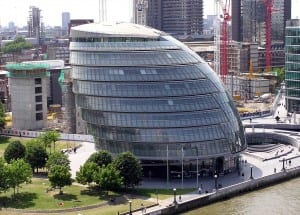Health and Wellbeing in Buildings: A Real Appetite for Change
By Clive Shrubsole, on 18 November 2016
The Health, Wellbeing and Productivity in Non-Domestic Buildings half day conference at UCL Gustave Tuck Lecture, has to go down as one of the most successful and timely conferences yet.
The conference was jointly hosted by UCL Institute for Environmental Design and Engineering (IEDE), CIBSE Home Counties SE and the CIBSE Natural Ventilation Group, and organised by IEDE’s Marcella Ucci, Vivian Dorizas and Rachel Kempsell, Richard Davies of (ARUP)-CIBSE HCSE and Colin Ashford of -CIBSE HCSE and CIBSE NVG – who was crucial in suggesting the conference and establishing the initial contact between CIBSE and UCL many years ago.
Tickets sold out very quickly and the venue was packed on the day. There was a vibrant and energetic atmosphere with both speakers and attendees enthusiastically taking part.
Along with two international speakers there were presentations from UK based speakers representing a variety of perspectives. It was clear from the scope and depth of subjects covered by the speakers, that the emerging emphasis on health, wellbeing and productivity in buildings has wide-ranging implications and has gained real traction with industry. The conference featured cutting-edge research, scientific evidence and case studies on health, wellbeing and productivity in relation to buildings in order to encourage stakeholders such as designers, consultants and environmental engineers to contribute to the design and management of healthier indoor environments, including supporting of clients. In addition, presentations included practical ideas on how to create healthy, comfortable and productive indoor environments with regards to indoor environmental quality (IAQ).
Videos of the individual speaker’s presentations are currently being uploaded to the UCL IEDE YouTube channel and will be available imminently
In her presentation, Marcella Ucci, Senior Lecturer at the UCL IEDE and course director of the new MSc on Health Wellbeing and Sustainability in Buildings of the Bartlett UCL, underpinned the need of new approaches to cover the performance gap and introduced the new UCL MSc on Health, Wellbeing and Sustainable Buildings of UCL* which fully covers the subject area. Marcella also raised the need for new models to investigate health & wellbeing outcomes and to build a business case study.
The real appetite for the subject was seen not only from the enthusiastic interchanges and questions to the speakers from the floor, but more by the fact that even after the networking event at the end of the conference, no-one had any desire to leave the building and had to be encouraged to leave, suggesting further such events are urgently needed.
*For more information about the New MSc, please email the Course Director, Dr Marcella Ucci.
For administrative information, please contact Leila Tufekci.
 Close
Close





